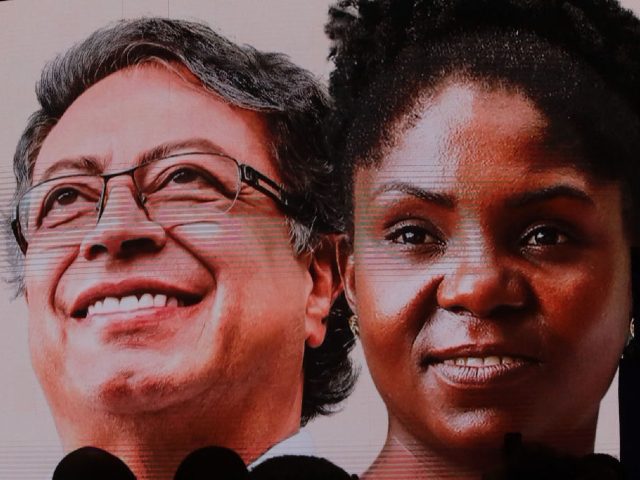The Revolutionary Armed Forces of Colombia (FARC), a communist narco-terror organization, issued a press release on Wednesday celebrating the election of former guerrilla member Gustavo Petro to the presidency of the country, its first leftist president in history.
Petro narrowly won last week’s runoff election against non-ideological outsider Rodolfo Hernández after dismissing the other candidates, including conservative establishment choice Federico Gutiérrez, in May. Petro contested the election before it occurred, declaring it rigged and calling Colombia’s top election integrity official a “liar,” but has yet to challenge his alleged victory in the race despite hundreds of reports of election “irregularities.”
Petro, a former member of the Marxist M19 guerrilla, ran an extreme socialist campaign – promising, among other things, that he would end Colombia’s drug war and attempt to replace coca crops with marijuana.
The FARC is one of history’s deadliest terrorist organizations, over half a century old and engaging for decades in extreme human rights abuses such as the use of child soldiers, kidnapping, murder, rape, large-scale drug trafficking, and abortions of children conceived in sexual crimes against minors, among other crimes.
The FARC’s attempts to overthrow the Colombian government are believed to be the cause of hundreds of thousands of deaths. The group maintains close ties with rogue regimes like those of Cuba and Iran.
President Joe Biden de-listed the FARC as a terrorist organization in November, arguing that a 2016 “peace deal” giving the FARC uncontested seats in Congress resulted in the disbanding of the group and that active FARC members were actually “dissidents” and part of a group called “Second Marquetalía.” In reality, “Second Marquetalía” is the name the FARC has given to its current war against the Colombian government, not the name of any organization.
In a long and florid message, the FARC celebrated Petro and Vice President-elect Francia Márquez for allegedly championing “love” and “peace.”
“On June 19, an extraordinary event occurred that will mark the history of Colombia: the end of 200 years of successive oligarchical governments that never had a feeling of love for the people, but the hardest stone hearts,” the statement, titled “Change Is Unstoppable,” read.
“Let’s go all in, with heart and soul, in the collective purpose of achieving full peace for Colombia,” the terrorist group continued. “Let us all without fear join the first line of struggle for social justice.”
The FARC urged Petro to fulfill his promises to combat “climate change” and “return peace and dignity to us.”
“We support the government of life and hope that is being born as a new dawn, willing to return peace and dignity to us, to defend the world from climate change with the shield of the Amazon rainforest,” the terrorists proclaimed.
The FARC also encouraged Petro to fight America, a longtime close ally of the Colombian government: “let us not forget the Monroeism remains alive and conspiring against our unity to dominate us without resistance.”
“Monroeism” is a reference to the Monroe Doctrine, an American policy implemented in the 1800s and directed at Europe at the time asserting that Washington would reject all forms of colonialism in the Western Hemisphere.
The text of the statement also appeared to indicate that FARC terrorists were willing to provide unspecified protection to the country’s new socialist leaders, affirming, “Let us protect Petro and Francia so that nothing happens to them and they have long enough lives to push Colombia towards the future.”
Petro has yet to publicly denounce the FARC’s support of him or place any distance between himself and the terrorist organization at press time.
Following the FARC, the National Liberation Army (ELN), Colombia’s second-largest Marxist terrorist organization, issued its own statement on the election, demanding a “radical change” in the country’s policies against illicit drugs.
“Substituting illicit crops in Colombia is just one necessary part of ending drug trafficking,” the ELN – whose members have been indicted internationally on charges of narcoterrorism – boldly declared. “The failed war on drugs, after 50 years of disasters, demands an alternative policy cosigned by consumer countries. Colombia, as the country most affected by this war, demands a radical change in the anti-drug strategy.”
The group also affirmed it would continue to engage in terrorism while simultaneously urging Petro to consider peace talks like those that gave the FARC uncontested seats in the Colombian Congress in 2016.
“The ELN is actively maintaining its system of struggle and political and military resistance, but also its full readiness to move forward on a Peace Process,” the terrorists asserted.
Petro has yet to put forward a proposal for his administration’s relationships with the communist terrorist groups, but he has until August to plan his government before his scheduled inauguration. On Wednesday, Petro invested time into improving Bogotá’s relationship with one of the primary supporters of the FARC: Venezuelan dictator Nicolás Maduro, which Colombia does not formally recognize as president of the country.
Maduro ceased being the legal president of the country after the rigged election of 2018, which Venezuelan lawmakers identified as a “rupture in the democratic order” – the constitutional language that allows the National Assembly to inaugurate an interim leader. Colombia recognizes rightful president Juan Guaidó as Venezuela’s head of state.
“I have communicated with the Venezuelan government to open the borders and re-establish the full exercise of human rights on the border,” Petro said in a statement on Twitter on Wednesday. The Colombian left has complained for years that the border between the two countries is insufficiently open, a gripe that outgoing President Iván Duque dismissed this week.
“The borders haven’t been closed,” Duque said, according to the Colombian right-leaning magazine Semana. “‘Pablito’ is over there, ‘Antonio García’ is over there, ‘Iván Márquez’ is over there,” Duque continued, referring to high-profile FARC leaders known to operate in Venezuela.
Duque urged Venezuela to extradite FARC terrorists back home.

COMMENTS
Please let us know if you're having issues with commenting.